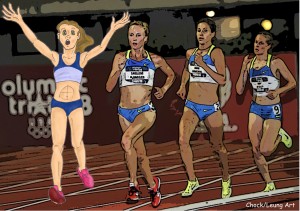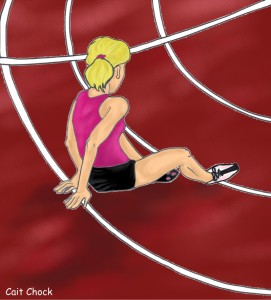Male runners working harder than their female counterparts? Reading this article in the Evolutionary Psychology Journal makes it sound like these professors have come to just this very conclusion.

Before all us runnerchicks get our bunhuggers in a bunch, let’s take a gander at their case evidence and logic. The prose is that the ‘average male’ is running relatively faster times than the ‘average female’ runners; that is to say that if you take the current World Record and leading times and then times that average runners race at, the the men are proportionally closer to these elite times than the women.
This is true despite the fact that the rate of increase in number of females who are now taking part in our sport is vastly more than the men. For example the increase in male participation from 1989 to 2009 in road races was 60% where for the women it was 498%. (for NCAA Track and Field it was 32% for the men and 98% for the women) Though there are other factors that quantify such a leap, namely females being ALLOWED to participate…that and for college, the inclusion of Title IX certainly has upped the numbers.
So going into the study, these professors hypothesized, “In any given race, about three to four times as many men as women ran relatively fast. The stable sex difference in relative performance shown here for non-elites constitutes new support for the hypothesis of an evolved male predisposition for enduring competitiveness.”
Through the study they built their argument into three points:

* Males tend to be more competitive than women and thus push themselves harder. (I have raced against, run alongside, and befriended women who I know have more mental grit than many men. Females may not generally be as outwardly apparent in being ‘out for blood’ but after the gun goes off, there are no favors for friends…everyone wants the win.) The professors do point out that the numbers are higher for females going to races more as pleasure runners, being interested in just finishing and having fun regardless of the time, than for men.
* The number of males who are putting in a larger volume and higher intensity training program is more than for females. (It does take faster paced workouts to lead to faster race times, no doubt, so here it becomes a difference of goals between the sexes perhaps. Are more of the males interested in chasing a PR and then including the uptempo work versus wanting to run sheerly for the pleasure of running?)
* Males report keeping up that higher training level longer than women. (This could be affected by some factors: certain injuries, life ie: time off for babies, and anemia are all things women tend to suffer from more often than men. It takes consistent training to lead to improvement so these interruptions are doing females no favors.)
End of study findings: “These findings strongly suggest that the sex difference in performance depth can be largely attributed to more men being motivated to engage in the training necessary to run relatively fast.”

I’m going to remain an unbiased party here and say that these are generalizations and there are exceptions on both ends. Numbers do show that the gap between the average runnerchick’s times and those of the elites is larger than for men. I think a part of that DOES come down to women having the self-security to believe they are possible of achieving things.
By nature girls grow up with no shortage of ‘mean girls’ chipping away at the old self-esteem. It take believing in your goals to see them actualized. Self-esteem is one of the biggest benefits of sports for females because here there is an arena where we CAN prove we are tough as nails and achieve feats we can be proud of.
Men and boys may have a leg-up on us in some respects with the self-esteem issue however I don’t feel that needs to be an accepted excuse. Instead, I know there are oh so many runnerchicks who are out there busting their @$$ and I hope in time the black and white numbers will reflect this.
1) What are your thoughts on this study?
2) What do you think may be factors in the discrepancy between the genders?
3) Male or female, when you go to a race what are your main intentions? Do you go for a PR and fast time or do you go the more pleasure runner route and don’t worry about the time?

That’s pretty interesting. I would say that a lot of women race/run to not necessarily be competitive, or fit it in around other things in life that are equally (or more) important for them. I’m pretty competitive personally, but when it comes to training my husband/work always comes first before getting extra mileage in, and I’m sure my performance reflects that.
those are all good points, i have to admit the whole topic was super interesting to me!
I actually did a report on a very similar/related topic for one class and a presentation on this subject for another, and I still am not sure what to think!
no way! i’d love to hear more about wat u had to share, because like u said i’m sort of still torn…lol.
I have actually wondered about all of this myself… For example, why are women’s boston qualifying times 30 minutes slower than the men’s qualifying times for the same age groups? Thanks for sharing the info, this helps me understand it a little better.
EXACTLY!! that point is another thing that bugs me, it’s like reverse discrimination…why are the women’s times ‘softer’??
Very very interesting information – I’m glad that you wrote about it!! Definitely something I’m interested to look into. I think that like you said, there are definitely exceptions. It wouldn’t surprise me if more women were just running for weight purposes whereas more men would be competitive, but I don’t think that’s to say that there aren’t competitive women. This is something I’m going to have to think about! I have to say, the one thing I loved is this: “It take believing in your goals to see them actualized. Self-esteem is one of the biggest benefits of sports for females because here there is an arena where we CAN prove we are tough as nails and achieve feats we can be proud of. ” Running completely changed my life, taking me from depressed and no self esteem to confident and passionate. It’s something I wish more girls would get into!
so true, running has taught me so much and just like u i kno it’s saved me from myself! it gave me self-esteem and also taught me to respect wat my body can do for me so much more. 🙂
I plan on reading the study, but for now I’ll say that…well being a science major, I worked with statistics and studies a LOT, and the fact that there are a greater number of women running in GENERAL is going to skew the data – of course “more women” are “running for pleasure” than men…I mean there are more women overall! And even if this IS the case, its a generalization. All studies are, and there are always exceptions.
I think runners fall along a continuum. You’re not either “competitive” or a “fun-runner”. I think people see themselves at different levels of “competitve” – and I’ve gone through a lot of those levels. I started running to lose weight, I kept running because I loved it, I entered a race for fun and realized I had talent, and now (or…before injury and definitely after recovery!) I consider myself competitive – I have goals and will train like a beast to reach them. Competitiveness isn’t black or white, its a spectrum that each runner sort of evolves along as they go.
good point, many people do go thru stages or ‘phases’ in wat their goals are for running!
I think this study could be a little potentially damaging to the standing of female runners in some circles. I agree with Kate (above) about the data being skewed merely by the sheer number of women alone, there should have been more evidence collected about the main motivation for taking part; if there were women racing just for pleasure, or for weight loss efforts then their data shouldn’t really be included as they weren’t out to meet the elite times, they may have just been there to prove to themselves that they could achieve their goal.
I myself race for pleasure, run for pleasure and weight control and sanity. When I go out after the gun has gone off I’m not really too concerned about the time, other than finishing and having fun along the way. For me it is far more about the endorphins and the feeling of accomplishment rather than how many seconds, minutes, hours that I have been out for. In saying that I applaud everyone who goes out and gives it their best because their dream is to beat a magic number. I’ll cheer you on! As long as you wait at the finish line for me 🙂
i totally agree, i think some people may read this and feel a little defeatist in nature, but i sort of look at it like, “forget u, i’ll prove u wrong!” haha…naw, but i also agree that because there are just more women period out there running it will naturally make the averages a little skewed.
i adore u’re closing lines, and u know wat, so long as i see someone out there and putting in the effort they are rockstars in my mind! keep it up my awesome chickpea!! 🙂